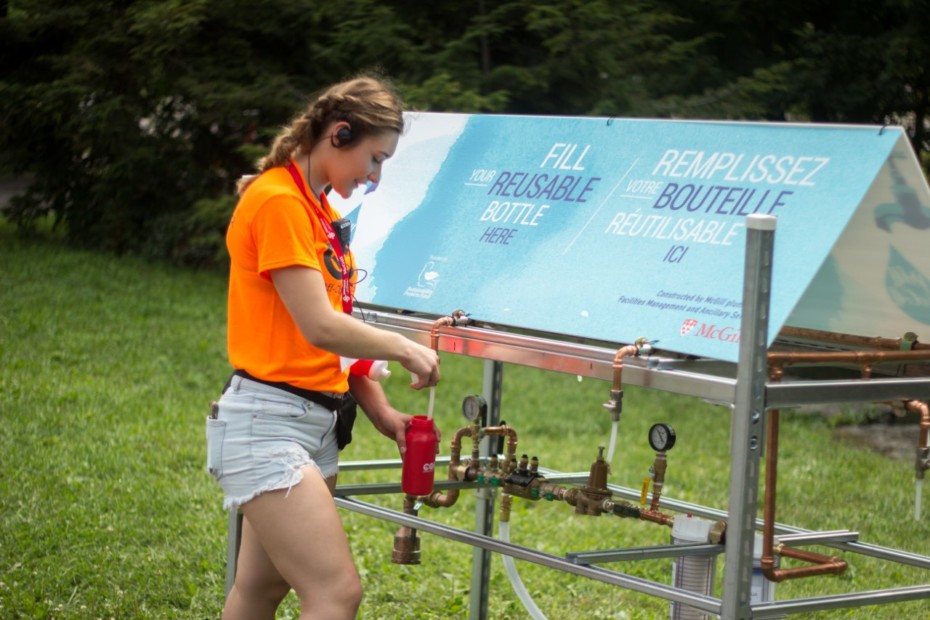
This fall, nine faculty and department Frosh attained Gold-level Sustainable Event Certification.
“I wasn’t sure if we would be able to get certify because we’re so big – we’re 1,800 students,” said Grace Jumbo, Inclusivity and Equity Coordinator for Arts Frosh, which also marked McGill’s 150th certified Sustainable Event.
Jumbo explained that before they began working with Miranda Roseland, the Office of Sustainability’s Sustainable Events intern, the list of sustainability criteria seemed overwhelming. With other faculty and department Frosh inclusivity coordinators all on board, Jumbo said they were all able to implement best practices with relative ease.
“I’m glad that the Office of Sustainability is initiating this program because I think it’s really important that people acknowledge sustainability,” said Jumbo. “Not only in their personal lives, but on a larger scale.”
A number of Discover McGill events, run by Campus Life & Engagement, also received Gold-level certifications, making sure students received a sustainable welcome to McGill.
Tracking their footprint
Together, the Frosh coordinators decided offsetting greenhouse gas emissions related to their events would be a priority. When participants purchased their tickets, they were able to opt-in by adding $1 to their ticket price. This year, more than 1,200 students opted in to offset the emissions related to their Frosh activities.
While the offset provider has yet to be selected, Jumbo said they will make sure they meet Gold Standard criteria, which ensure that carbon offset projects have the maximum positive impact.
Evren Sezgin, Inclusivity Coordinator for Science Frosh, said they hope to offset the equivalent of emissions coming from the transportation to and from events, including taxis used by participants, estimated using McGill’s carbon calculator, mc3gill.ca, and building energy usage, calculated by McGill’s Climate Officer.
The Frosh teams also collectively worked to reduce their carbon footprint by partnering with DriveSafe, a SSMU service that provides students with free rides around the island of Montreal. With designated pick-up stops at Frosh events, drivers were able to minimize the number of back and forth trips with empty seats in the car.
‘Anyone should be able to get involved’
Acting on the economic and social pillars of sustainability, Frosh inclusivity coordinators wanted to ensure that all incoming students had the opportunity to participate.
“If it’s their first week here, anyone should be able to get involved in Frosh, no matter their economic situation,” said Jumbo.
Sezgin and Jumbo explained that students without the financial means to participate on their own were able to apply for bursaries to cover their tickets. Eighteen incoming Arts students benefited from the bursary program.
“I love that,” said Jumbo. “It’s one of my favourite things on [our list of initiatives].”
Widespread accessibility in programming also contributed towards the events’ Gold-level certification. By collaborating with the Office for Students with Disabilities (OSD), frosh attendees had access to an adapted mobility bus service and the OSD Campus Access Guide, alongside several options to participate in non-drinking events.
Jumbo said that they also added icons indicating the venue’s level of accessibility to their schedules. Given the age of many of Montreal’s buildings, she said finding wheelchair accessible locations was not as easy as they would have otherwise hoped. She said this reinforced the importance of providing accessibility information to participants.
Conscious choices necessary for reducing waste
“We really wanted to cut down on things – like small coupons – that could be easily thrown away,” explained Sezgin, talking about Science Frosh’s sustainability priorities.
Rather, he said made all documents that typically would have been printed available to Science Frosh students through their mobile app. Of all the initiatives they launched this year, Sezgin said having all documents, such as schedules and tickets, centralized electronically was one of the most well received. An added bonus, of course, is the increased accessibility that comes with going digital-first.
In addition to reducing paper waste, Sezgin also said they focused on cutting down on the amount of merch given out to participants. Students were also given carabineers so that they could easily carry their reusable mugs by attaching them to belt loops and bags.
